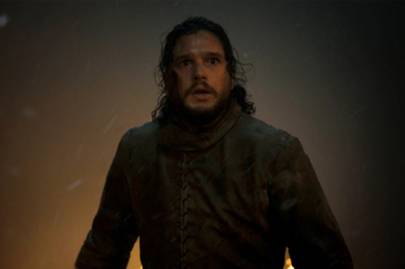NEWS
Why Is Game Of Thrones So Dark? We Asked The Cinematographer
May 1, 2019

HBO
Fans complained that the Battle of Winterfell was too dark to see properly. But cinematographer Fabien Wagner defends the gloom
Chris Stokel-Walker
Winter has well and truly arrived in Game of Thrones, with the first half of this week’s episode – which showed the Battle of Winterfell – enshrouded in darkness. Such was the depth of gloom, in fact, that some viewers are up in arms about the darkness of the episode, with many saying they struggled to see anything at all.
But Fabian Wagner, the cinematographer behind the episode, claims the problem lies not with the production team but with viewers’ own television setups. “A lot of the problem is that a lot of people don’t know how to tune their TVs properly,” he says. “A lot of people also unfortunately watch it on small iPads, which in no way can do justice to a show like that anyway.”

Game of Thrones has grown increasingly dark in its presentation since season five, but the latest episode was notably difficult to discern. It’s a stark difference from the crystal clear, backlit episodes of the show’s first series. In part, the change is down to a shift in tone throughout the show: as the subject matter has grown ever darker, so has the way it’s presented.
“The showrunners decided that this had to be a dark episode,” says Wagner. “We’d seen so many battle scenes over the years – to make it truly impactful and to care for the characters, you have to find a unique way of portraying the story.”
Wagner says that the majority of the darkness in the episode is thanks to the night-time shoot, with the rest of the atmosphere produced on-set through lighting choices. “Another look would have been wrong,” he says. “Everything we wanted people to see is there.”
But some fans and others working in the industry think the darkness of the episode in this case went a bit too far. Sophie Barrott, a videographer living in Manchester, says she only managed to make it 15 minutes through. “There's a fine line between creating atmosphere for your audience – who have waited eight seasons for a battle of light versus dark, the dead versus the living – to leaving them completely in the dark, straining their eyes beyond comprehension,” she says. “The lack of light sources, or the over-crushed blacks in the grade of the episode, create a confusing of a mix of frustration and intense imagination.” (Grading refers to post-production colour tweaking.)
Jake Mobbs, a London-based freelance commercial video editor and grader who works for big brands including Siemens, Tesco and Nike, says he understands viewers’ frustrations. “I have found myself bumping up the brightness at home when I’m watching an under-lit film to help pick up every detail and fully understand the story,” he says.
Wagner, however, says it’s not necessarily so important to catch every detail. “Personally I don’t have to always see what’s going on because it’s more about the emotional impact,” he says. He also says that how people choose to watch the programme may affect their experience. “Game of Thrones is a cinematic show and therefore you have to watch it like you’re at a cinema: in a darkened room.,” he says. “If you watch a night scene in a brightly-lit room then that won’t help you see the image properly.”
The programme makers are pushing the boundaries of light and darkness to the limits of their high-end technology, perhaps forgetting that the average viewer has a much less well-equipped screen. Jason Moffat, a colour grader based in London, says the fact that domestic screens are not always perfectly calibrated can also scupper moody images, rendering them unwatchable. “If you're walking a fine line in terms of subtlety in a grade environment and some details are only just visible in the grading suite, it can fail to translate on a consumer setup if the screen is only a little bit off – which, generally speaking, they are,” he says. Wagner says that broadcasters can also complicate matters, with bitrate compression playing havoc with footage deliberately shot in the dark.
Dark images aren’t just a problem with Game of Thrones. The Walking Dead, Teen Wolfand Agents of S.H.I.E.L.D. have all faced criticism from viewers and critics for being too difficult to discern. David Meadows, a cinematographer and director of photography for commercial projects who is increasingly asked to produce work with the “Game of Thrones look”, says part of the problem is down to advances in camera technology. High-end series are often shot on 8K cameras, which are very sensitive – but if you’re not watching in 8K, you may not get the full level of detail.
For his part, Wagner is taking the criticism in his stride. “With a lot of hype comes a lot of criticism,” he says. “People love to find something to talk about, and so that’s totally fine.”
Read More:
https://www.wired.co.uk/article/game-of-thrones-too-dark-to-see

 then "Add to Home Screen"
then "Add to Home Screen"